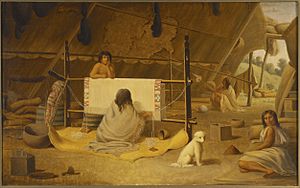Salish Wool Dog facts for kids

A Salish Wool Dog in a 19th-century painting of Coast Salish weaving
|
|
| Origin | Washington state and British Columbia |
|---|---|
| Breed status | Extinct |
| Domestic dog (Canis lupus familiaris) | |
The Salish Wool Dog was a special type of dog that lived a long time ago. It is now extinct, meaning there are no more of these dogs alive today. These dogs were white with long fur, similar to a Spitz dog.
They were raised by the Coast Salish people. These Indigenous groups lived in what is now Washington state and British Columbia. The Salish Wool Dog was very important to them.
About the Salish Wool Dog
The Salish Wool Dog was carefully bred by the Coast Salish people. They kept these small, long-haired dogs separate from other dogs. This helped keep their fur pure white and long.
The dogs often lived in groups of 12 to 20 animals. They were fed mostly salmon, both raw and cooked. To make sure the breed stayed special, the dogs were kept in safe places. Sometimes they lived on islands or in gated caves. This prevented them from mixing with other dog types.
Why Their Wool Was Special
The fur of the Salish Wool Dog was very valuable. It was used to make famous and rare "Salish" blankets. The Coast Salish people did not have sheep. Also, getting wool from wild mountain goats was very difficult. So, the dog fur was a precious resource.
The dogs were sheared, just like sheep, usually in May or June. Their fur was so thick that it would hold together in one piece. Captain George Vancouver, an explorer, saw this himself. He noted how thick and strong the dog's fleece was.
These special blankets were highly prized items. They were important in the "potlatch" system. This was a traditional way for people to share wealth and show status. The dog hair was often mixed with other materials. These included mountain goat wool, feathers, and plant fibers. This helped make the yarn stronger and stretch the supply of the valuable dog fur.
A Piece of History
In 1859, a preserved specimen of a Salish Wool Dog was sent to the National Museum of Natural History. This important piece of history was rediscovered in their collection in 2003. It helps us learn more about these unique dogs.
 | Frances Mary Albrier |
 | Whitney Young |
 | Muhammad Ali |

